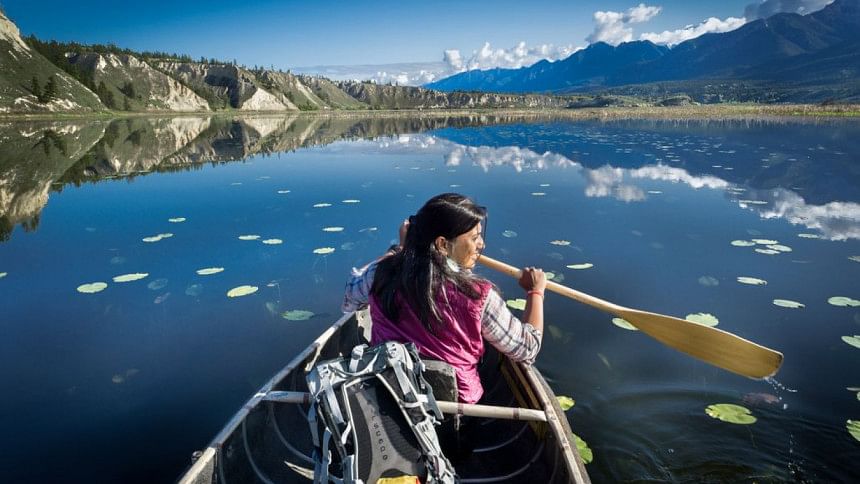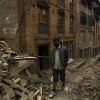Nat Geo's exclusive with emerging explorer Wasfia Nazreen

Wasfia Nazreen, the first Bangladeshi to climb the Seven Summits, has made her country proud yet again, as National Geographic Society honours her with its Emerging Explorer award for her commitment to empowering women and girls through outdoor education and adventure.
Here is her exclusive interview with National Geographic where she talks about her childhood, inspiration, future aspirations and many more:
Wasfia Nazreen gained acclaim for being the first Bangladeshi to climb the Seven Summits, which she completed in 2015, and now she's using the momentum to bring her love of the outdoors to young girls. An activist, writer, and social worker, Nazreen's personal pursuit of climbing has become a worldwide message of celebration and hope for women in her native country and beyond.
She is now building a foundation called Ösel, her Tibetan name that roughly translates as "luminosity." Through it, Nazreen plans to offer outdoor education and mindfulness training programs for adolescent girls in Bangladesh, Nepal, and, in the long term, the greater Himalayan region. She's still planning big climbing expeditions, too, which people can follow on her Facebook page.
You were working with nonprofits in the Himalayan region, which is where your mountaineering began. Tell us more about that.
My base was in Dharamsala, India, but I was traveling a lot in and out of Tibet and Nepal and the greater Himalayan region because of all the mountain people I was working with at that time. For mountain communities, whether it's Tibetans or Sherpa people, climbing is a sacred journey. It's not going out to conquer—rather, it is a journey to surrender to the mountain. Everyone I worked with, they might not be in the Western definition "qualified mountaineers," but they were skilled people on the mountain who also joined in climbing, so that's how I got introduced to bigger mountains. Even before that, I started trekking while I was studying in Scotland and in the Appalachian regions of the United States.
That's where I found that going back to nature, going back to mountains, I could really heal myself. It was a very personal journey, because I had a very traumatic upbringing as a child and as a teenager, and that's where I found my refuge.
Can you talk more about your upbringing?
Because of certain circumstances, I had to take care of myself from a very young age. But when I look back at it, that's made me who I am today. I realized at a very young age that the only way to set myself free, and to be independent, would be to educate myself. The whole drive to be educated started from there.
How did your nonprofit work start?
While I was still in college [at Agnes Scott in Georgia], I had a grant to go to India and study how women were using art as therapy. In Dharamsala I worked with Tibetan women who had gone through so much torture in their lives at Chinese prisons. A lot of them had been sterilized and had seen the worst possible physical and mental violence you can think of. While I was working with them, the whole time I was the one who was crying. But these women were radiating really joyful compassion all the time and praying for the people who hurt them. That was a very life-altering experience for me, at that age especially—barely 21. Forgiving your enemies and really embodying that principle in your day-to-day life was something that was very new to me.
Even though I had a job in the States lined up for after graduation, I decided on the flight back that I needed to go back there. I didn't have any guarantee at that time about who I would be working with, or what kind of job would await me, or how much the salary would be. Nothing like that. So I just had to take that leap of faith. Two weeks after moving there, everything was set in place, which was great.
It seems like in your life, a lot of times you've been brave enough to just wing it. What have you learned from diving into things with a lot of unknowns that you would tell someone younger?
[Sometimes if] you live an idealistic life, you tend to box yourself in this small world. We just have to trust there's such a bigger world out there. If we respect our intuition, and work honestly and with patience, everything will be taken care of by the universe. As cliché as it sounds, I believe it 100 percent.
A lot of my problems in life got solved after climbing all these mountains. For example, family members came back to my life, I was finally socially accepted, and now I was a matter of pride—to a lot of people I was a source of shame before. I always say if I had known that this would solve so many problems I would have climbed these mountains many moons ago.
None of us knows when we're going to exit this planet. We just have to trust our intuition and not waste it living someone else's life, which is often the case for South Asian women—we're made to live other people's lives. I'm sure everywhere in the world that happens, but for my region specifically, from very early on in life we're treated [as] more of a weight than a child that you love.
What made you think of climbing as something that could be a potential tool for you in this larger goal of helping women and your country?
To be very honest, I didn't actually think about it logically, like climbing would be the best, but that's what I knew I could do. Climbing was my passion, and the activism and nonprofit work was my career, so I put that together to highlight how far women had come, at the same time recognizing that we still have a long way to go.
At home, many people could relate to it because living in this society is such a huge struggle. But I did not think it out like that; I just knew that worked for me and was a good parallel. Walking to every continent by itself, symbolically, was taking Bangladesh to every continent. The struggle on the mountain was the struggle of the women in our society.
What is your focus on the activism side, going forward?
I have worked for a long time with the indigenous people in my country and I'm going to be focusing a lot more on their wisdom. With Ösel Foundation, a lot of our projects and trips [with schoolgirls] will be about taking care of Mother Earth and really reflecting on how much our time on Earth affects it negatively. It's just mindful awareness on walking this planet. It's about honoring the feminine energy. The curriculum is a combination of both Western wilderness studies and Eastern philosophies to grow the heart. Children in our education system are taught to grow materialistically, but schools don't necessarily educate the heart.
Source: National Geographic

 For all latest news, follow The Daily Star's Google News channel.
For all latest news, follow The Daily Star's Google News channel. 








Comments